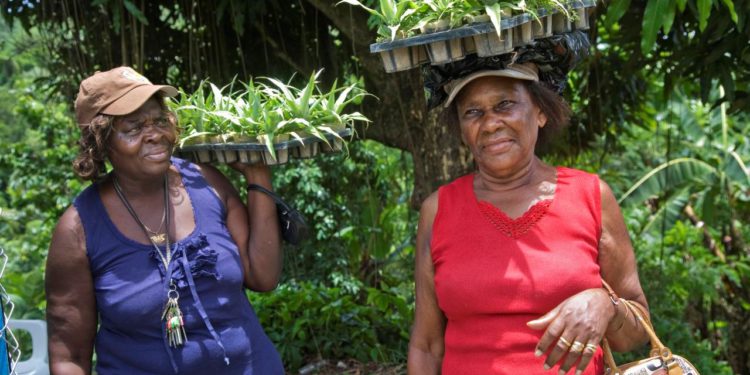23 July, 2021, Bridgetown, Barbados – The Food and Agriculture Organization of the United Nations (FAO), in collaboration with the Caribbean Community (CARICOM) and Global Affairs Canada, recently hosted a webinar aimed at sensitizing practitioners in the Caribbean on gender mainstreaming methodologies and good practices that can be used to strengthen the region’s response to the effects of climate change on agri-food systems.
The seminar attracted nearly 500 participants comprising of government representatives and practitioners from CARICOM member states who are involved in programme and project development and implementation, as well as individuals from the private sector and civil society.
Across the globe we have witnessed the impacts caused by climate change through irregular rainfall patterns, increased temperatures, greater number and intensity of hurricanes and the rise in sea level. The Caribbean, due to its geographical location and the unique issues facing its many Small Island Developing States (SIDS), has experienced significant loss and damage from climate-related disasters.
Existing gender gaps, such as unequal access to resources,training and information, contribute to men and women experiencing climate change effects differently. In addition, gender-blind approaches of policies and programmes to address climate change can further exacerbate negative impacts and added burdens, particularly for the most vulnerable women and men. It is therefore critical that personnel involved in designing and implementing programmes and projects understand and identify existing gender gaps, as well as the associated risks and differentiated impacts of climate change on women and men to set in motion more equitable solutions.
It is with this background that Global Affairs Canada, CARICOM and FAO recently planned and hosted a gender mainstreaming webinar in the context of the projectCooperation for Climate Change Adaptation and Resilience in the Caribbean, which aims to promote climate change adaptation in agri-food systems (crops, livestock, forestry, fisheries and aquaculture) and to build the resilience of rural populations and their livelihoods in the sub-region.
This webinar aimed to spur action by sharing projects withstrategies that seek equality between men and women through climate-resilient interventions in agri-food systems in the Caribbean. The lessons learnt, tools and best practices in gender mainstreaming approaches from these examples may be adapted and replicated by other countries in the region to expand their individual gender mainstreaming efforts in climate change interventions.
Renata Clarke, Sub-Regional Coordinator at FAO, explained that in the Caribbean rural economy, where agriculture is a key contributor to livelihoods, important gender gaps are still prevalent. For example, in Grenada only 22 percent of registered farmers are women, while the share in Jamaica is 30 percent. The gender gap widens in agricultural jobs with the female share ranging from only 6 percent in Belize, to 24.5 percent in Trinidad and Tobago.
“Women also face several gender-based inequalities to transition from subsistence farming to commercial agricultural production, such as insufficient access to land, financial capital, technology and market information. FAO is committed to working in the Caribbean region to innovate in agriculture and transform practices to meet climate change challenges in a gender equitable manner”, Clarke stated.
Meanwhile, Shaun Baugh, Programme Manager for CARICOM,stressed that climate change and gender mainstreaming are two cross-cutting issues that are prominent in every single initiative undertaken by CARICOM. “It is important that the policies put forward assist in bridging or reducing the gaps that exist between women and men so that the livelihoods of our women are protected and enhanced and not affected by climate change”,said Baugh.
Christian DaSilva, Senior Acting Director at the Canada Caribbean Regional Development Program, stated that gender equality and empowerment of women and girls is the best way to eradicate poverty. “Canada is committed to helping build a more prosperous and climate resilient Caribbean community”, DaSilva indicated.
The Cooperation for Climate Change Adaptation and Resilience in the Caribbean project supports nine countries in the region (Antigua and Barbuda, Belize, Dominica, Grenada, Guyana, Jamaica, St. Lucia, St. Vincent and Grenadines, and Suriname)in strengthening their institutional capacity around climate resilience and disaster risk management through training and technical assistance and enhanced access to climate finance. Climate-smart digital technologies and gender mainstreaming in the project cycle are a particular project focus. This has resulted in 141 representatives learning how to integrate gender dimensions in the adoption and use of digital technologies, as well as being able to identify climate-smart agriculture digital technologies and tools that can be adopted at country and institutional levels, such as the FAO Gender Toolkit.









